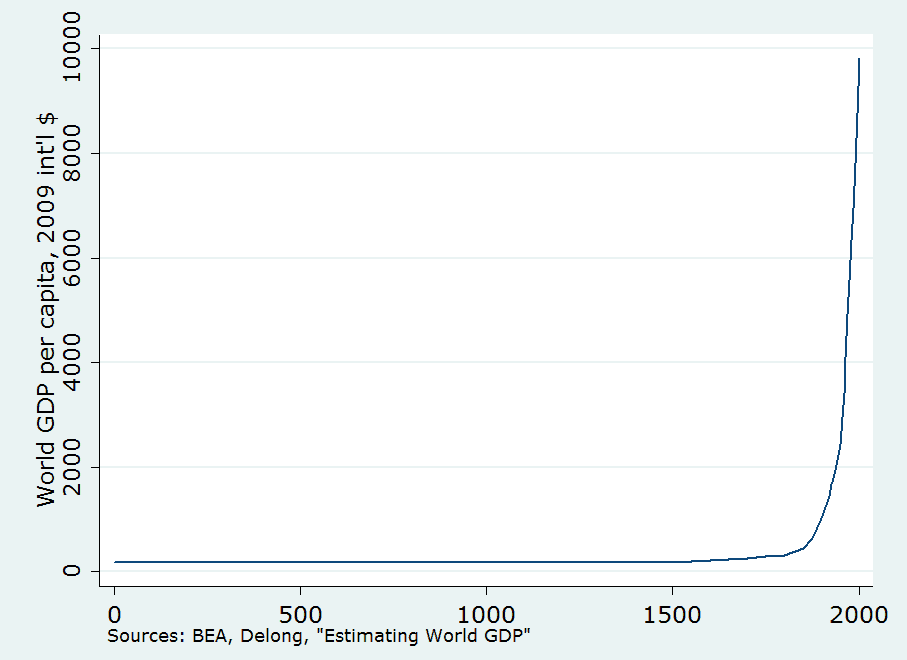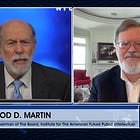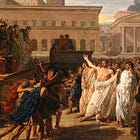Christianity Commands Capitalism
The entirety of Scripture not only assumes but commands private property rights. It also commands profitability on the Master's investment, in all areas of life.
This essay is free, but with Premium Membership you get MORE. Join today.
by Rod D. Martin
August 17, 2025
Christianity commands Capitalism.
Yes, this will come as a shock to your gender studies professor, your hippie uncle, and perhaps even your (non-economically trained) pastor. But it's true.
The entirety of Scripture not only assumes but commands private property rights, in minute detail. Even at the macro, Ten Commandments level, not only is theft prohibited, but even just thinking about theft (covetousness) is also.
There’s a reason. Christian economics begins not with the idea of scarcity, as your college microeconomics class did, but with ownership: God’s ownership, of all things, including you. Scarcity is the result of the Curse, but God’s ownership is constant, before the Fall and after the Second Coming. He delegates that ownership to specific individuals — stewards — to care for and improve His property, just as He did with Adam in the Garden.
His servants are differently gifted. Some are artists. Some are inventors. Some are evangelists. Some work the cash register at Taco Bell. And as in the Parable of the Talents, God rewards some servants for their profitability (materially or spiritually or both), and He punishes others for their failure to use what He’s given.
Thus, the roles we find ourselves in are rarely fixed, and indeed, the more a society encourages the freedom that Scripture requires, the more social mobility one sees. Failures become legends. Billionaires go bankrupt. Nothing is static in God’s economy, spiritually or materially, but over time He is always growing His spiritual and material investment. So He always requires profitability of His stewards, regardless of their current circumstances, with whatever He may have given them.
He can do this because all of it, and all of us, belong to Him.
Now delegation provides enormous freedom of action. If one should choose to “hold all things in common”, as the Jerusalem church (but only the Jerusalem church) did in the First Century, that’s within the servant’s delegated authority (although the terrible results at Jerusalem suggest that one should reconsider). What is not within anyone’s authority is to steal. And “anyone” includes the state.
God establishes the state and recognizes the legitimacy of taxes. But in 1 Samuel 8, He limits the taxing power far more than moderns do, much as He only requires 10% (the tithe) at church. Again, He can make these rules: it all belongs to Him. And while governments, like churches and families, are indeed delegated some powers that individuals do not possess, God restricts that authority as well (ask Saul, or Uzziah). The only nationalization of a private business ever depicted in Israel — Ahab and Jezebel’s seizing of Naboth's vineyard — is portrayed as wicked, not as "social justice". Theft is still theft if carried out by groups of people, not just by individuals. The Bible calls it “oppression”.
On the positive side, it is Paul's illustration of the different parts in the Body of Christ, and God's repeated assertion that those parts — us — are differently gifted, which forms the basis of the breakthrough concept of the Division of Labor. This key intellectual insight enabled not only the Industrial Revolution but the unprecedented hockey stick spike in global living standards since the 18th Century.
Which is to say, had prior generations taken Scripture more seriously, and applied it more comprehensively, the ancient Irish might have had iPhones, the Romans rockets.
At the beginning of the Industrial Revolution, as had been true for millennia before, 94% of the world's population lived in extreme poverty (less than a dollar a day in current dollars). In the comparatively brief time since, that percentage has almost flipped. But this is not to be measured in mere money: rather, it should be seen in the reduction of human suffering, the establishment of education, the increase in our life expectancy (from just 47 in 1900 to 82 today), or in Biblical terms, the pushing back against the Curse.
From the Creation Mandate to Proverbs 31 to the Parable of the Talents, Scripture encourages thrift, investment, entrepreneurship, and the multiplication of capital. Nowhere does it suggest equality of outcomes, not even in Heaven. And this is with reason. God has made each of us an individual. He has different plans for each of us. And He weaves all of those together into the tapestry of His creation.
Statist regimentation obliterates that beauty in a sea of uniformity, and of uniform misery.
The Word counsels obedience to government in Romans 13, but it also places limits on that obedience, most obviously in the Apostles' rebuke to the Sanhedrin in Acts 5 ("We must obey God rather than men"). God’s boundaries apply to God’s property. Unlawful orders must be disobeyed, because God’s authority over His own property is higher than any person’s.
This is intentional, and extraordinary, on God’s part. While individual wealthy people might and will act sinfully, the concentration of most or all assets in the state results in the state’s deification: it becomes the dispenser of all blessings and curses, and as its absolute power corrupts it absolutely, it acts with the aspirations to godhood God shows us in Nimrod, Pharaoh and Caesar.
This is exactly why statist regimes have hated God’s church in all eras. Christianity asserts rights that belong only to a power they cannot control, and freedoms He has made inalienable from each individual. This the Socialist cannot bear.
By contrast, the positive impact of private property is extraordinary. In Capitalism, no man may get ahead except by solving other people’s problems, better and more cheaply than others. Indeed, the market incentivizes even the basest and greediest of men to seek out those other people’s problems, and expend their own time and treasure to creatively solve them, all while requiring no one to accept their proposed solution. Buggies were good, cars were better, with different kinds for every need.
The system of private property and competitive markets makes following the Golden Rule, something the sin nature resists, profitable. It causes society to abandon force in favor of persuasion. It harnesses the strong to serve the weak, the precise opposite of top-down Socialism.
Capitalism is the systemic implementation of the Creation Mandate and the Second Greatest Commandment, no matter how much sinners may abuse the freedom it establishes. And no matter how adorned by good intentions, Socialism is the systemic violation of the 8th and 10th Commandments, if not all the rest. It is the very essence of oppression. And ultimately, it robs God.
Don't pretend Christ has no opinion on economic matters. Christ, the Creator of all things, the incarnate Word Who breathed all Scripture, has told us His opinion from Genesis to Revelation.
Too many among us just like maintaining enough wiggle room to envy and steal, whether individually or through the state.










